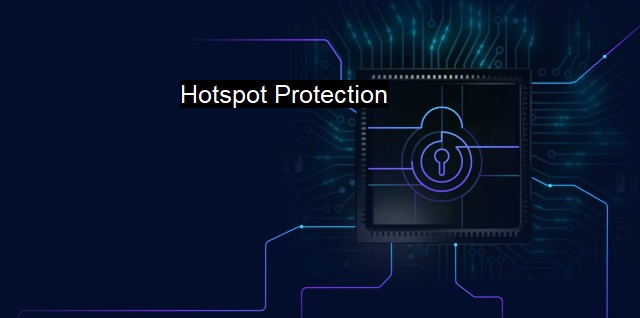What is Hotspot Protection?
Ensuring Online Safety in Public Wi-Fi Hotspots: The Importance of Hotspot Protection and Antivirus Software to Combat Cyber Threats
Hotspot Protection is an essential component in cybersecurity and antivirus practices. It is widely used by individuals and businesses alike to guard sensitive information and overall internet activity against potential threats while using unprotected public Wi-Fi networks often referred to as hotspots, thus its name Hotspot Protection.Wi-Fi hotspots are prevalent in today's digital age. Whether in offices, shops, restaurants, or hotels, most people use their portable devices like tablets, phones, and laptops to connect to the internet. Unfortunately, hotspots can serve as an easy gateway for hackers to access your data. Thus, hotspot protection is vitally important for everyone who uses such networks.
Hotspot Protection, utilizes software solutions, majority of which are VPNs (Virtual Private Networks) primarily designed to preserve user safety and privacy whilst they are connected to the internet via a public network, therefore less secure, hotspot. VPN wraps data in layers of advanced encryption, disguising it in a format that hackers and intruders can't understand, thus successfully perturbing threats towards a user's data privacy and security.
VPN, being central to Hotspot Protection, helps in preserving anonymity by hiding the user's IP address, and preventing traffic analysis. This destroys a hacker's mechanisms of tracking a user’s sessions, undermining their attempts at hacking into personal data. For businesses this feature provides additional security layer when remote employees access company servers and data.
More advanced hotspot protection solutions introduce antivirus modules to its offerings. These systems intelligently detect, isolate and eliminate harmful elements like malware, adware, ransomware and various viruses, further bolstering device's resistance against threats.
Antivirus component adds analysis capability of downloads, websites, links, URLs and email attachments, across various OS environments. By doing this, it effectively prevents threats from penetrating the system in the first place. This significantly diminishes risk of successful phishing attacks, spam, and malicious content downloads.
Sandboxing environments are created to allow suspicious files or programs to run, with the intention of observing their behaviour without imminent harm for host system. Once a risk is detected, user is notified and remedial action takes place immediately.
Another key feature of Hotspot Protection is automatic public Wi-Fi security. Some solutions are designed to enforce VPN connections whenever a device is connected to a public network, relieving users from the need to manually engage protections.
User should be careful while choosing Hotspot Protection solution as the effectiveness of these services may differ. Good Hotspot Protection software will offer updated and newest antivirus protection, regular security patches, and prompt customer service. Attention should be given to leak-protection mechanisms, these prevent accidental data leakage during intermittent interruptions in VPN service.
The importance of Hotspot Protection in today's globally interconnected world cannot be undermined. The rise of remote workers, freelancers and digital nomads imply the growing public Wi-Fi network usage, thereby exposing us to mountainous cybersecurity threats. This reinforces the need for reliable Hotspot Protection. By using high-quality cyber security software that includes Hotspot Protection, we secure not only our privacy, but also mitigate the risk of data loss, fraud or potential business disruption. We cannot leave our devices unprotected while we interact with these networks. The enhancement of existing solutions, and development of new ones remains a relevant imperative in the modern digital age.

Hotspot Protection FAQs
What is hotspot protection?
Hotspot protection refers to the security measures taken to protect your devices when you connect to public Wi-Fi networks. It involves using antivirus software, firewalls, and encryption to secure your online activities and prevent unauthorized access to your personal information.Why is hotspot protection important for cybersecurity?
Hotspot protection is important for cybersecurity because public Wi-Fi networks are often unsecured, making them easy targets for hackers to access and compromise your personal information. With hotspot protection, you can protect your devices from malware, phishing attacks, and other cyber threats that may occur while using public Wi-Fi networks.What are some ways to protect your device when using a public hotspot?
Some ways to protect your device when using a public hotspot include using a VPN to encrypt your internet connection, using antivirus software to scan for malware, avoiding accessing sensitive information such as passwords or financial information, and disabling file sharing on your device.Can hotspot protection also protect me from physical security risks?
No, hotspot protection cannot protect you from physical security risks such as shoulder surfing or theft of your device. However, using a privacy screen on your device and being aware of your surroundings can help to reduce the risks of physical attacks while using a public Wi-Fi network.| | A | | | B | | | C | | | D | | | E | | | F | | | G | | | H | | | I | | | J | | | K | | | L | | | M | |
| | N | | | O | | | P | | | Q | | | R | | | S | | | T | | | U | | | V | | | W | | | X | | | Y | | | Z | |
| | 1 | | | 2 | | | 3 | | | 4 | | | 7 | | | 8 | | |||||||